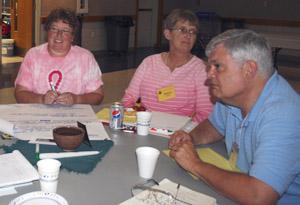
By Anne Marie Amacher
DAVENPORT — Building and maintaining community and helping neophytes (Catholics newly initiated into the church) to grow in their faith doesn’t stop at the Easter Vigil. The growth process continues through the period of mystagogy, which occurs between Easter Vigil and Pentecost.
About 70 people hoping to foster that growth attended a two-day seminar on mystagogy held July 24 and 25 at St. Paul the Apostle Parish in Davenport, said Gale Francione, local coordinator.
Sponsored by the Diocese of Davenport in partnership with the North American Forum on the Catechumenate, the seminar drew participants from dioceses in Davenport, Dubuque and Des Moines in Iowa, Peoria and Chicago in Illinois, Milwaukee in Wisconsin and Galveston-Houston in Texas.
During the Friday morning session, presenter Linda Licata asked, “What does your mystagogy look like?” She chairs the Commission on the Rite of Initiation of Adults in the Diocese of Charlotte, N.C. and coordinates adult initiation in her parish.
After participants divided into groups to discuss her question, one attendee described mystagogy as a time of reflection. One parish offered mystagogy as reflection time for anyone, and was surprised by the number of long-time parishioners who attended. “They want to know more,” a parishioner said.
Another parish hosted a picnic, which included a session on the general topic of mystagogy. That allowed people to ask whatever questions they had.
Father Mike Schaab, the seminar’s other presenter, emphasized the importance of community through the initiation process and mystagogy. The pastor of St. Pius X Catholic Church in Rock Island, Ill., he said parishes should not “abandon” the new members and that the whole parish community should be available to teach what they know.
The community (parish) must celebrate its faith and reflect on it. “Every baptized Christian has a story. Enable them to share it. Put together a vision and look critically at how to accomplish it,” he said.
One participant asked for suggestions on how best to convey the beauty of such rites as the scrutinies.
Trish Gallagher, pastoral associate at Our Lady of Victory Parish in Davenport, said whole community catechesis is essential. The parish has a question box in its bulletin each week. “We explain what is coming up and why it is important.”
Father Jim Vrba, pastor of St. Mary Parish in Wilton, talked about the various rites celebrated in the church year-round. “It is essential to have good liturgy. It’s what we’re introducing them to.”
Dave Cushing of the Waterloo parishes in the Archdiocese of Dubuque said the seminar offered him the challenge he was looking for. He learned that he has not appreciated the role of the whole community in the process of mystagogy and hopes to make some changes.
Reflecting on the two-day seminar, Gallagher, who attended with Karen Nagy, Betsy Kuennen and Msgr. James Parizek, Our Lady of Victory’s pastor, said “We have been working together with initiation for many years. But the forum’s presenters offered a real challenge for our future efforts.
“The vision is the whole Christian community being engaged in mystagogy, which is the on-going reflection on the mysteries of our faith. The reflection is not just for first year ‘converts,’ but for all of us pledged to continuing conversion as active disciples of Jesus.
“Our first challenge as members of the community working closest with the process is to explore how this vision makes a difference in what we are already doing, then to find creative ways the vision can be spread to the life of the whole parish. What a job ahead! What a joy!”
Tammy Norcross, pastoral minister at Sacred Heart Parish in Newton, said, the presenters of the institute “continued to remind us that during mystagogy the neophytes and all the baptized are to meditate on the Word, participate in Eucharist and perform Works of Mercy.
“Many of the participants, including me, came to the realization that our mystagogy sessions don’t appear to be much different than our catechumenate sessions, when in fact they should be very different. We learned that the setting for mystagogy is not the classroom but in the pews and in the midst of the faith community.”








